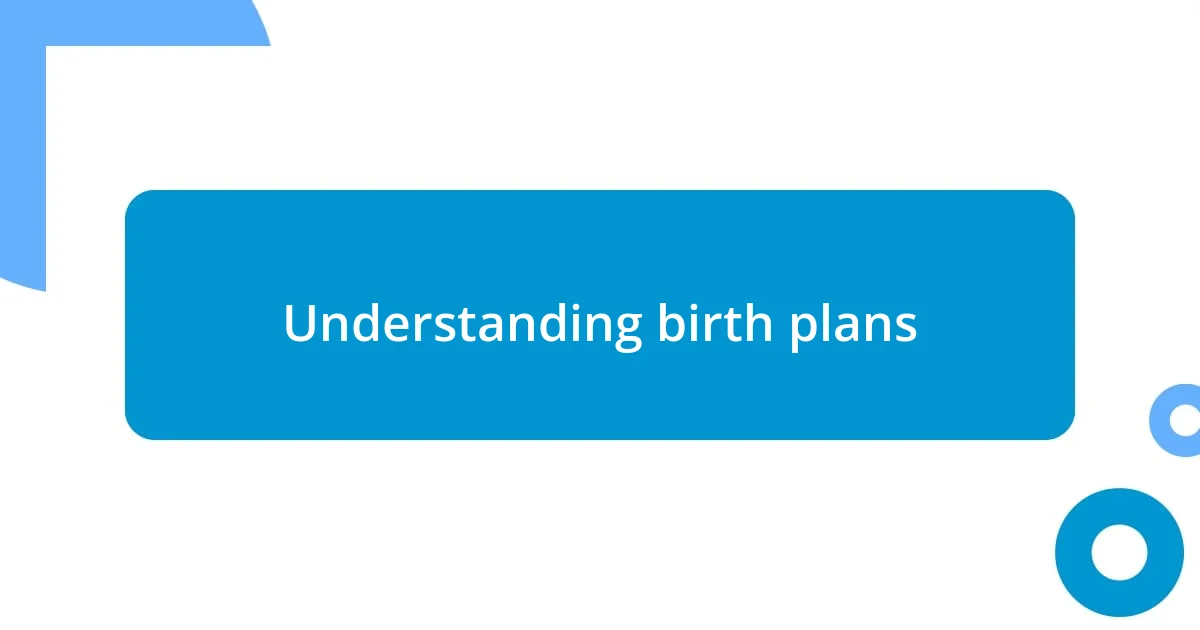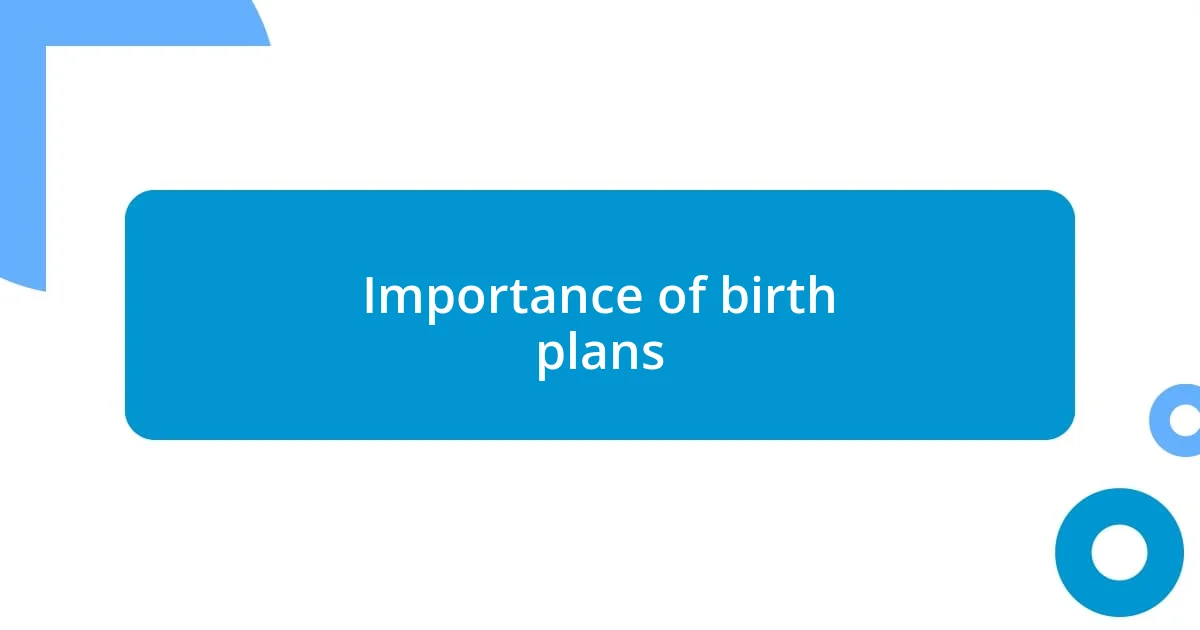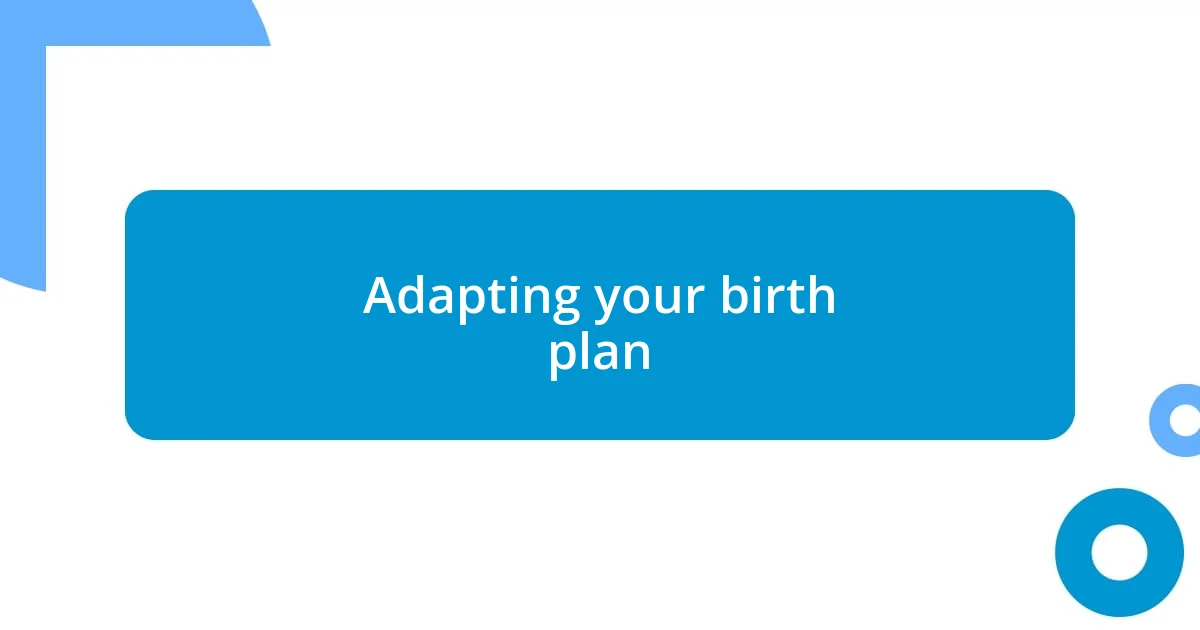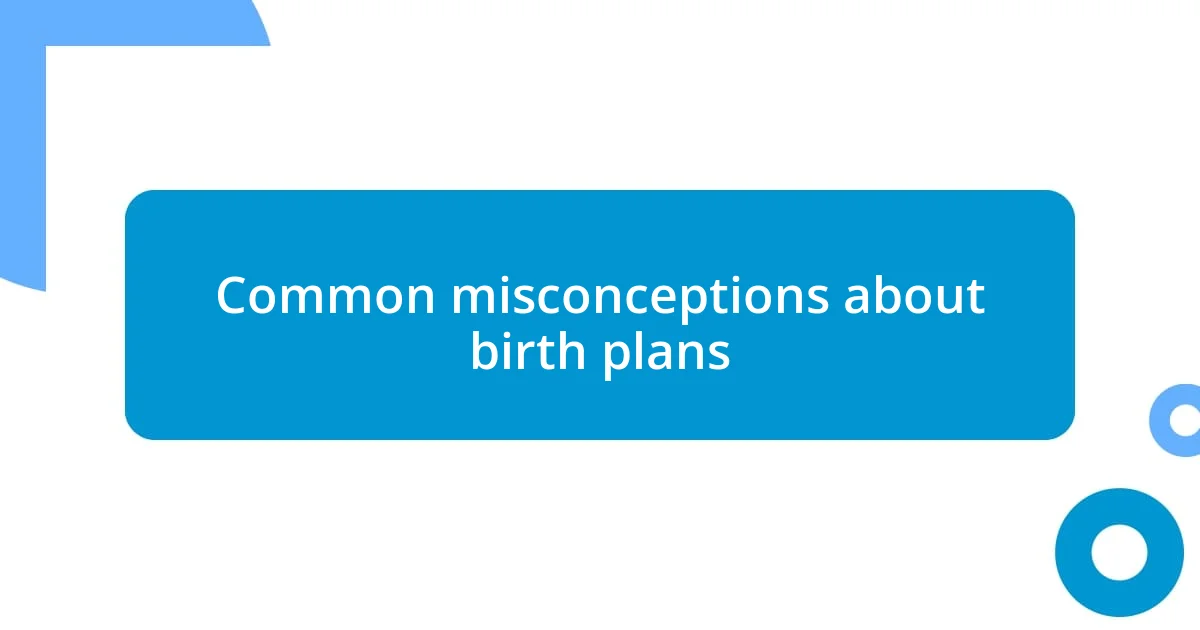Key takeaways:
- A birth plan is a dynamic tool that outlines preferences while encouraging communication with healthcare providers, allowing for flexibility during labor.
- It promotes clarity and empowerment, helping expectant parents articulate their desires and alleviate anxiety associated with uncertainty.
- Common misconceptions include viewing birth plans as rigid, assuming they eliminate pain relief options, or expecting guaranteed outcomes; flexibility and openness to change are essential.

Understanding birth plans
A birth plan serves as a roadmap for your labor and delivery, outlining your preferences and wishes for the big day. I remember when I was preparing mine, I felt both excited and anxious. What if the nurses didn’t understand my choices? It made me realize that clear communication was key to feeling empowered in such an emotional moment.
When considering a birth plan, think about what matters most to you. Do you want pain relief options? Or perhaps a specific environment during labor? Personally, I found writing down my preferences helped me clarify my thoughts and ease my fears. It transformed my apprehension into a sense of control.
Remember, flexibility is vital. Birth is unpredictable, and things may not go according to plan. I learned that while my birth plan provided a guideline, being open to changes allowed me to embrace the experience fully. Isn’t it fascinating how our expectations can shape our journeys, even when life’s surprises throw us off course?

Importance of birth plans
Having a birth plan is incredibly important because it serves not only to communicate your desires to the medical team, but also to help you articulate what matters most during labor. I recall feeling a surge of confidence when I shared my preferences with my healthcare providers. That moment made me realize how much a birth plan could alleviate the anxiety often associated with uncertainty.
Here are some key reasons why birth plans are important:
- Clarity for Everyone: It ensures everyone involved understands your wishes, reducing the likelihood of misunderstandings.
- Empowerment: Writing it out gave me a sense of control in what felt like an overwhelming situation.
- Facilitates Discussion: It opens up conversations with your healthcare provider about your choices and any possible scenarios.
- Expectation Management: A well-thought-out plan helps you anticipate the process and emotionally prepare for different outcomes.
- Personalization: Your birth plan reflects your unique preferences, making the experience more special.
The emotional journey of creating a birth plan can’t be understated; it prepares you mentally while fostering a sense of ownership over your birthing experience.

Adapting your birth plan
Adapting your birth plan is one of the most essential parts of the process, especially as circumstances evolve during labor. I found myself in a situation where my carefully laid plan had to change when I encountered unexpected medical advice. That moment taught me the importance of listening to my body and trusting my healthcare providers, even if it meant straying from my initial ideas.
I believe communication with your birthing team is critical when adapting your plan. For instance, if your labor progresses differently than expected, discussing modifications right away can lead to a more supportive environment. The more I engaged in open conversations with my nurses, the easier it became to translate my needs into actionable changes. This collaborative approach somehow turned the uncertainty into a shared journey, rather than a solo endeavor.
Ultimately, a birth plan isn’t merely a static document; it’s a living guide that can change as your experience unfolds. When I embraced this flexibility, I noticed it helped me feel less anxious about the unknowns. Instead of viewing alterations as setbacks, I began to see them as opportunities for growth during such a pivotal moment in my life.
| Original Plan | Adapting Plan |
|---|---|
| Water Birth | Medication for Pain Relief |
| Non-interventionist Approach | Monitoring for Safety |
| Immediate Skin-to-Skin Contact | Delayed If Necessary for Baby’s Health |

Common misconceptions about birth plans
When it comes to birth plans, one common misconception is that they are rigid and cannot be altered. In my experience, viewing a birth plan as a set-in-stone document can lead to unnecessary stress. Instead, I found that being open to changes allowed me to better navigate the unpredictable nature of labor. Have you ever considered how flexibility can play a role in your own plans?
Another misunderstanding is that having a birth plan means you won’t have any pain relief options. I’ve heard people express concerns that advocating for a birth plan could force them into discomfort. However, developing my plan included discussing pain management and ensuring I had access to all available options. Embracing this holistic view actually empowered me to make informed choices rather than feeling trapped by my initial preferences.
Lastly, some believe that a birth plan guarantees a specific outcome. I can relate to the hopefulness that comes with crafting a detailed list of wishes. Yet, I learned firsthand that the beauty of a birth experience lies in its unpredictability. My journey took unexpected turns, but each moment taught me about resilience and adaptability, reinforcing the idea that plans are merely a guideline, not a contract. Isn’t it empowering to recognize that every birth story is unique and filled with its own lessons?














